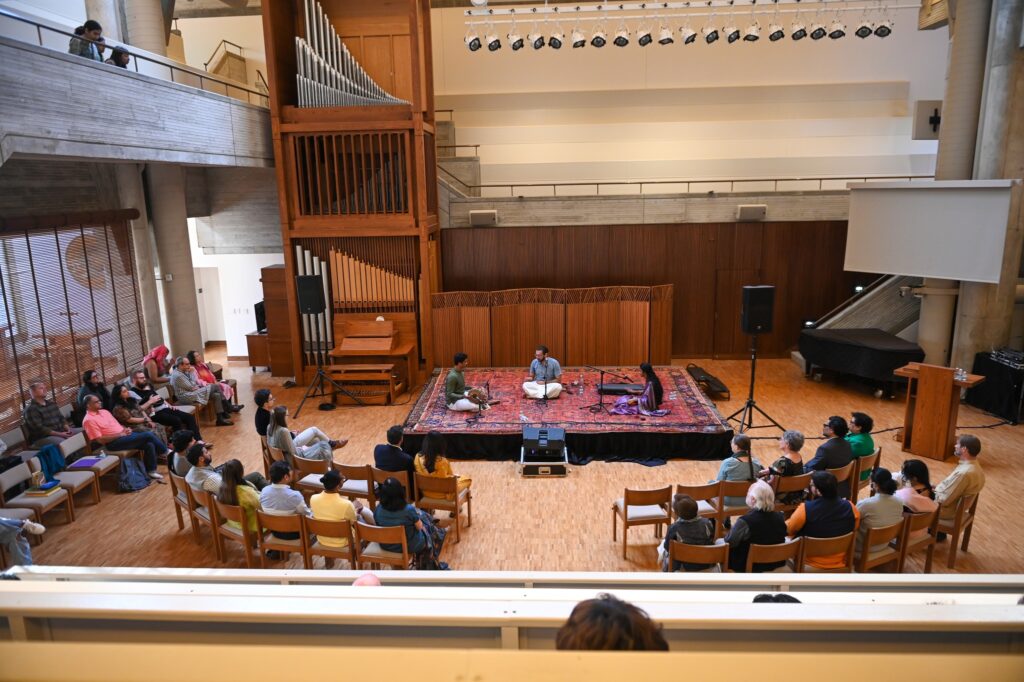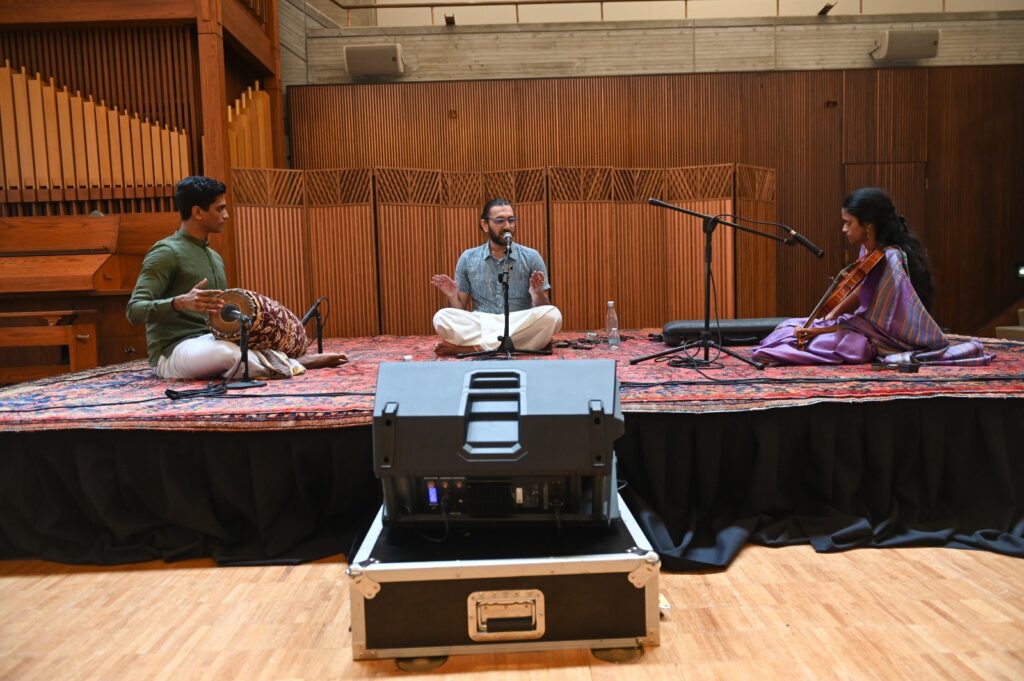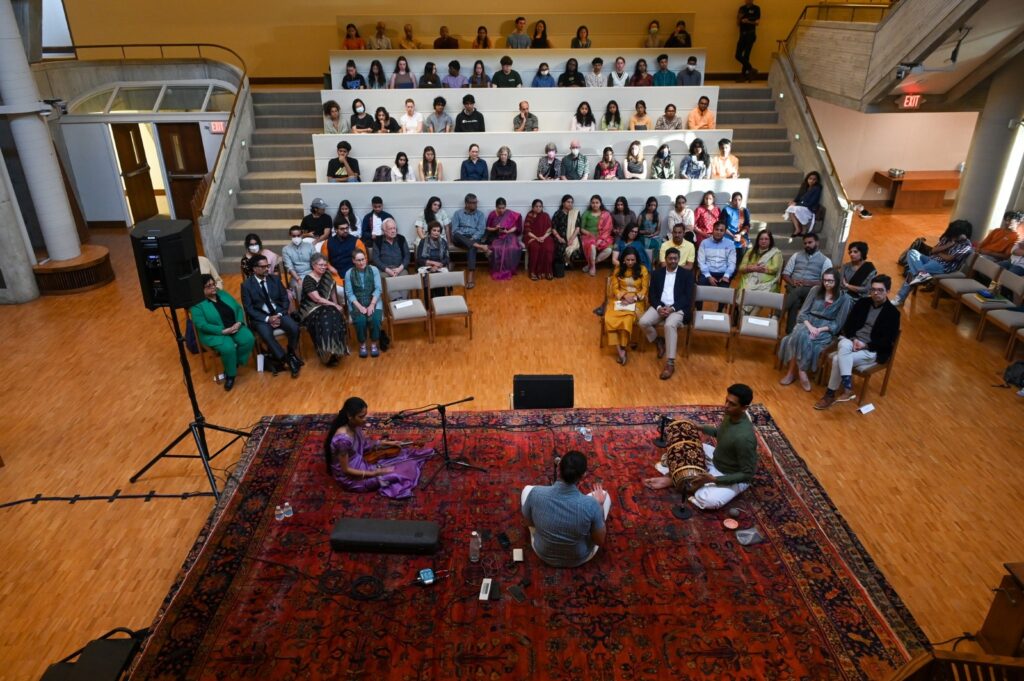Convergence in a Carnatic concert
A recent Carnatic concert presented in the south-eastern city of Atlanta in the United States reflected a beautiful amalgam of cultures, faiths, diasporas and demographics.
The event was organized by Emory University’s Office of Spiritual and Religious Life, and Telugu Studies at Emory. The venue, Cannon Chapel, within Emory’s campus, was built to be intentionally interfaith with no permanent religious symbols in the interior. The chapel hosts at least 20 diverse religious and philosophical gatherings weekly, including Protestant Worship, Catholic Masses, Muslim Jumu’ah Prayer, Hindu Aarthi, and Buddhist Meditation.
This article appeared in The Hindu newspaper on April 10th 2023, and is part of the Kalpalata Fellowship for Classical Music Writings for 2023.

Flanked by the chapel’s organ and a piano and drum set, the artistes ensconced themselves for a 90-minute program presented to a diverse audience comprised of a mix of Emory administration – including Provost Ravi Bellamkonda and Senior Associate Dean of Faculty Deboleena Roy – Emory faculty, graduate and undergraduate students, staff, and members of the Atlanta community.
The vocalist was Shiv Subramaniam, musically a student of PS Narayanaswamy, Vani Sateesh and Lakshmi Balasubramaniam. A PhD in Sanskrit and Comparative Literature from Columbia University, Shiv is an Assistant Professor of Religion at Emory University. On the violin was Sruti Sarathy, a native of the San Francisco Bay Area, a student of Anuradha Sridhar of the Lalgudi lineage and mentored by the Hindustani violinist Kala Ramnath, of the Mewati gharana. Sruti has a Bachelor’s degree in Mathematics and a Masters in French Literature from Stanford University. Arvind Narayan, on mridangam, has lived in Atlanta for most of his life and has a Masters in Computer Science from the Georgia Institute of Technology. He learned mridangam from Santosh Chandru, Guruswami Iyer and Subra Viswanathan and is a regular performer in the area.
The team, all born and raised outside India, began the concert with Muthuswamy Dikshitar’s brihadISvaro, in gAnasAmavarALi, with kalpanAswaram-s. Shiv prefaced each song with succinct English descriptions. An AlApana of rItigowLai followed, with dvaitamu sukhama and kalpanAswaram-s. Shiv stated that Tyagaraja appeared more interested in which of the two philosophies – duality or non-duality – was more comfortable to live with than in which was the truth. nIku tanaku, in bEgaDa, as the main item, featured AlApana, neraval, kalpanAswaram-s and tani Avartanam. Shiv described this piece as Tyagaraja imagining his relationship to God as that between a debtee and a debtor, where God is late on his payment of grace. The audience, comprised of people of different faiths, was visibly appreciative of this interpretation. Emory being a leading institution in the USA for the study of Telugu literature and culture (with a department dedicated to Telugu studies), Shiv and Sruti had explored Telugu kriti-s with interesting lyrics that would also convey the beauty and engaging features of Carnatic music.

A composition of Sruti Sarathy’s in bindumAlini followed. Sruti explains. “In 2020, following the death of George Floyd, I had several conversations with my Carnatic colleagues in America: Shiv, Roopa Mahadevan, and others. We felt a desire to express our grief over the events that had taken place, and also, more than ever, a responsibility to clarify the values to which our music should speak: resistance against oppression, plurality, friendship and community-building, justice. The starting point for me, ‘tEDAde maname,’ which is traditional in form and contemporary in message, emerged out of thinking through these issues. The song uses language and references that are typical of traditional kriti-s (such as pRAsam), but it says: ‘O mind, do not seek sameness and similarity in the world. Instead, use your voice to sing and celebrate difference.’ This is an expression, through the medium of Carnatic music, of solidarity with Black Lives Matter.” Shiv adds, “Sruti and I believe that while many Carnatic compositions are devotional, the repertoire need not be limited to devotional themes. We incorporated this song to share our sense that Carnatic Music is a music for our world and our times.” The song appeared particularly apt for Atlanta, a city with an almost exactly 50% black demographic.
A medley of Tamil pieces followed, including viruththam-s by Kulasekara Azhvar and Arunagirinathar and C. Rajagopalachari’s kuRai onrum illai, sung exactly in line with MS Subbulakshmi’s iconic rendition. Shiv’s articulate, crystal-clear pronunciation of the lyrics of all the pieces presented was commendable. But for a father rocking his young baby, nobody stirred in the audience during the program. So rapt was the attention that even appreciative clapping seemed an intrusion. Shiv, Sruti and Arvind received a standing ovation at the conclusion.
The program was also part of a series on performance, titled Puspita: Asian Arts at Emory, co-organized by faculty members Prof. Harshita Mruthinti Kamath (Department of Middle Eastern and South Asian Studies), Prof. Maho Ishiguro (Department of Music), and Prof. Shiv Subramaniam (Department of Religion). The co-sponsors included Emory University’s David Goldwasser Series in Religion and the Arts, the Department of Middle Eastern and South Asian Studies South Asia Seminar, Department of Religion, the Hindu Students Association, the South Asia Women’s Collective, and Swara (Emory’s Indian Classical Music Club).
